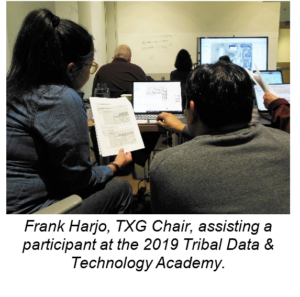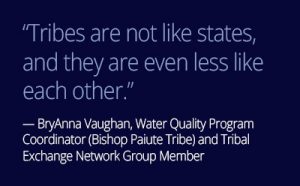In the United States, there are 574 federally recognized Native American and Alaska Native tribes and villages. Although each is unique, there are commonalities in the challenges they face. Tribes collect data to assess the environmental conditions that impact their lands, resources, and their communities, but often have limited capacity to fully support this work with their available resources.


The Tribal Exchange Network Group (TXG) is a Tribal Partnership Group supported by the EPA and the Institute for Tribal Environmental Professionals (ITEP), whose purpose is to engage tribes in Exchange Network (EN) opportunities including grant funding, technical solutions, and collaborative partnerships. The TXG is guided by its mission to support tribes’ management, analysis, and sharing of their environmental data, and advocate for EN strategies that respect tribal sovereignty.
Additional activities facilitated by the TXG and ITEP include supporting tribe-to-tribe mentoring activities, conducting webinars and conferences, and hosting workshops as part of the Tribal Data & Technology Academy. Training, information, and mentoring support is available to tribes on topics such as data management and analysis, geospatial information systems software tools, databases, and basic R programming. These activities facilitate tribal understanding of the value of their data and how to use them more effectively. Tribes can also learn how to leverage technology to transform their data into meaningful information. Ultimately, the goal of these activities is to build capacity by establishing the skills, knowledge, and connections needed to grow and sustain tribal programs into the future.
If you are interested in connecting with the TXG or other tribal programs to provide mentoring, training, or other support, contact TXG@tribalexchangenetwork.org or NEIEN@nau.edu. Visit www.tribalexchangenetwork.org for more information on tribes and the EN.
For more information, contact Lydia Scheer or Natasha Fulton of ITEP.
